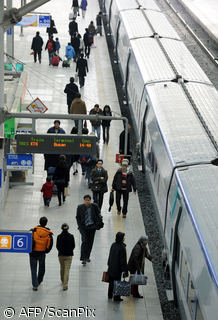The Russian Gas monopoly Gazprom intends to take action in order to force The Ukraine to pay for gas and stop the country from exporting it to Europe.
Published:
7 July 2000 y., Friday
Russian deputy Prime Minister Viktor Khristenko has reported that gas deals between the two CIS members are to be radically revised and a new payment procedure is to be introduced soon. By October 1st this year, the Russian government will have prepared a set of documents regulating gas transactions between the two states. Judging from the published excerpts from those documents, Russia will no longer tolerate The Ukraine’s non-payment and gas theft.
Firstly, to stop gas deliveries through The Ukraine would mean loosing lucrative contracts with Germany. Secondly, Kiev has cunningly managed to use Gazprom’s and the Russian authorities’ interests to suit its own ends, by promising the Kremlin that The Ukraine could delay its bid to enter NATO. The Russian authorities willingly bought these promises.
Politics aside, there were also economic reasons for Russia’s lenience towards The Ukraine. Gazprom has always acted as a private legal entity, although the Russian government holds a 41% stake in the gas giant. However, Gazprom continuously delayed tax payments, omitted dividends, and state representatives were given a disproportionately low share of the seats on Gazprom’s board of directors.
The government therefore did not take great pains to defend Gazprom’s interests.
Russia also insists that The Ukraine should stop illicit gas deliveries to Europe. The problem is that The Ukraine purchases Russian gas on favorable terms, regularly delays payments to Gazprom and then resells gas at high European prices, thus disrupting the stability of European gas supplies.
Šaltinis:
Internet
Copying, publishing, announcing any information from the News.lt portal without written permission of News.lt editorial office is prohibited.
The most popular articles
 The mission held constructive discussions with Prime Minister Emmanuel Nadingar, Finance Minister Gata Ngoulou, Infrastructure Minister Adoum Younousmi, and other senior officials.
more »
The mission held constructive discussions with Prime Minister Emmanuel Nadingar, Finance Minister Gata Ngoulou, Infrastructure Minister Adoum Younousmi, and other senior officials.
more »
 The EBRD is helping to improve the quality of power supply and stimulate renewable sources of energy in the Caucasus with an €80 million sovereign loan to Georgia for the construction of a new high voltage transmission line - the Black Sea High Voltage line, which will interconnect Georgia and Turkey.
more »
The EBRD is helping to improve the quality of power supply and stimulate renewable sources of energy in the Caucasus with an €80 million sovereign loan to Georgia for the construction of a new high voltage transmission line - the Black Sea High Voltage line, which will interconnect Georgia and Turkey.
more »
 The EBRD is helping to improve the infrastructure of the Georgian capital, Tbilisi, with a €100 million loan for the construction of a new railway route bypassing the city.
more »
The EBRD is helping to improve the infrastructure of the Georgian capital, Tbilisi, with a €100 million loan for the construction of a new railway route bypassing the city.
more »
 One of the men considered to be the founding fathers of the euro currency met MEPs on the Foreign Affairs Committee Tuesday (16 March) to talk about transatlantic relations.
more »
One of the men considered to be the founding fathers of the euro currency met MEPs on the Foreign Affairs Committee Tuesday (16 March) to talk about transatlantic relations.
more »
 European Trade Commissioner Karel De Gucht today opened a conference focused on the European Union's trade policy towards developing countries.
more »
European Trade Commissioner Karel De Gucht today opened a conference focused on the European Union's trade policy towards developing countries.
more »
 At the beginning of the 2000s, state ownership in financial intermediation in Mexico accounted for about 20 percent of the total credit of the banking system, provided through development financial institutions and funds.
more »
At the beginning of the 2000s, state ownership in financial intermediation in Mexico accounted for about 20 percent of the total credit of the banking system, provided through development financial institutions and funds.
more »
 Halving the number of business failures by offering individual support, doubling the number of young people who want to start their own business or raising by 500% the number of enterprising new cooperatives are just some of the projects nominated for the European Enterprise Awards 2010.
more »
Halving the number of business failures by offering individual support, doubling the number of young people who want to start their own business or raising by 500% the number of enterprising new cooperatives are just some of the projects nominated for the European Enterprise Awards 2010.
more »
 The European Commission has published the fourth call for proposals for the creation and upgrade of freight transport services under the second Marco Polo programme.
more »
The European Commission has published the fourth call for proposals for the creation and upgrade of freight transport services under the second Marco Polo programme.
more »
 The European Central Bank (ECB) today announced a programme of technical cooperation with the Central Bank of Bosnia and Herzegovina, in collaboration with a number of euro area national central banks (NCBs).
more »
The European Central Bank (ECB) today announced a programme of technical cooperation with the Central Bank of Bosnia and Herzegovina, in collaboration with a number of euro area national central banks (NCBs).
more »
 The EU disbursed today €1 billion to Romania, the second instalment of a €5 billion loan, which was agreed in May 2009 as part of a multilateral financial assistance package.
more »
The EU disbursed today €1 billion to Romania, the second instalment of a €5 billion loan, which was agreed in May 2009 as part of a multilateral financial assistance package.
more »